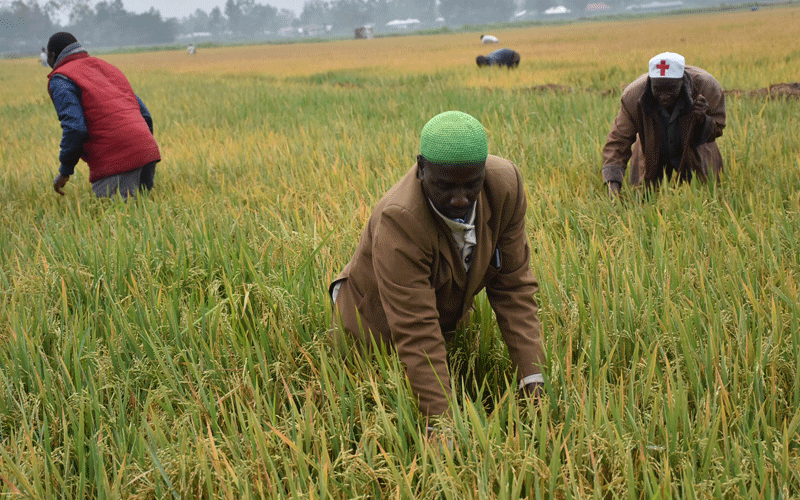Agony of rice farmers as birds invade
By Viola Kosome, March 18, 2022Doreen Anyango screams her lungs out as she scares a swarm of birds from her rice farm at the West Kano irrigation scheme.
The birds fly a short distance and patch on another line of rice crop.
Anyango makes another attempt to scare them away. This time round, running the entire width of her one-acre farm while angrily shaking a huge branch of a tree she had plucked to chase away the birds.
Frustration is clearly written on her face and it is easy to tell the desperation she is enduring in her bid to protect her immature rice from bird invasion.
She is among hundreds of rice farmers staring at heavy losses as a result of a bird invasion that has raided rice farms in the vast Nyando rice belt, leaving a trail of destruction in their wake.
The birds feed on mature and immature rice and are a constant menace to rice farmers.
For Anyango, however, the pain is real, she had taken a loan to cultivate the crop but is now unsure of whether she will be able to repay the loan as the destructive birds continue to pitch tent in the area.
“It is not easy for us. We have to chase the birds manually the whole day. The birds are destroying our crop and are leaving us with nothing,” she explains.
And for the first time, after engaging in rice farming since 2007, she is now contemplating abandoning the crop.
“We have a bird menace. We are counting huge losses as a result of the invasion of the birds. I cannot harvest the rice because they are still immature but birds are eating and destroying them,” she says.
At the vast rice scheme, we found several farmers fruitlessly struggling to chase a flock of birds from their farms.
Across several farms that we visited, farmers have erected scarecrows to help chase away the birds but that too, is not helping as birds continue to ravage the farms. Birds have had a huge effect on rice production and that even the scarecrows they are erecting were not helping them.
Crosshead
In March last year, the National Irrigation Authority (NIA) began the expansion of the Ahero and West Kano irrigation schemes. And with the authority keen to expand the area under rice production, hundreds of farmers in the vast scheme were keen to exploit the opportunity.
The development was part of the efforts to help farmers recover from the devastating effects of raging floods that destroyed several farms in 2021.
But despite the efforts, the bird invasion remains a huge problem to the farmers who claim most of them have now abandoned rice production. Farmers have now been forced to dig deep into their pockets to pay bird chasers in a bid to reduce losses.
According to David Olang’o who has been farming rice for the last seven years, he says chasing the birds requires the efforts of several people who must be present in the farms throughout the day.
Olang’o said that every bird chaser is paid between Sh5,000 to Sh7,000 per month and each acre is being guarded by four bird chasers which is way too expensive for them to afford.
Some who gets overwhelmed with the birds he said run away after receiving their payments.
A majority of the farmers staring at heavy losses as a result of the destructive birds have leased the farms and the situation is also worsened by middle-men who take advantage of the farmers to acquire their produce cheaply.
With the bird menace, several farmers have been forced to harvest their produce prematurely. The National Irrigation Authority however says that apart from causing losses to farmers, premature harvests are also a danger to consumers.
Crosshead
Francis Okello, another farmer, claimed that after he lost almost his entire two acres to birds last year, he abandoned the crop after harvesting prematurely the remaining part that had not been destroyed by the birds.
According to the Regional Manager Western Kenya Scheme under the National Irrigation Authority Joel Tanui, apart from the losses in terms of the income from the farmer, farmers are now harvesting premature rice and when they do harvest premature rice just because of scare of birds, there is a likelihood of Aflatoxin that is dangerous for consumers.
The authority however claims that efforts are underway to develop a repellent that would scare away the birds and protect the rice in the fields
According to Joel Tanui, NIA Nyanza regional coordinator, there is a company that is currently testing a bird repellent, a bird repellent where they will be able to spray and repel the birds without killing them.
“The pest control board he is currently doing a test of it to evaluate its efficacy in terms of repelling the birds,” he said.
